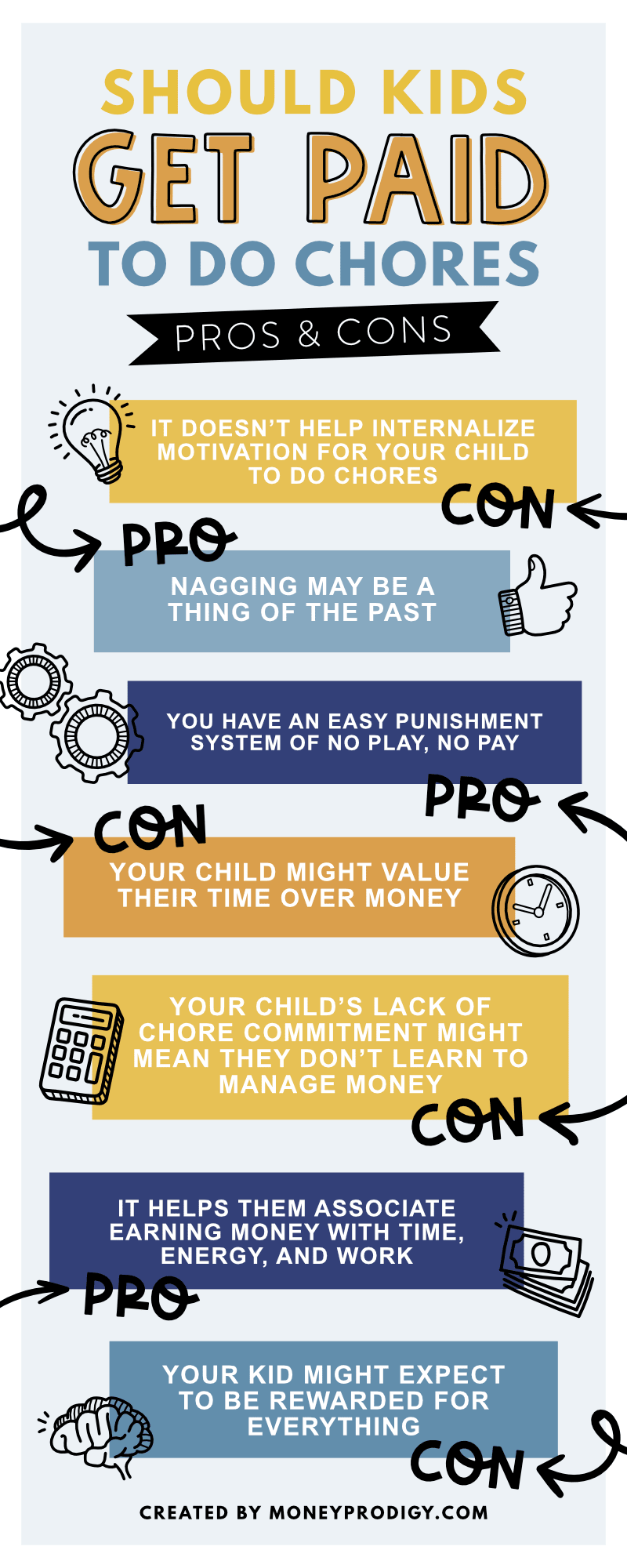Should kids get paid to do chores? Let’s discuss the pros and cons and facts about kids getting paid for chores so that you can make an informed decision.
If you google the phrase ‘Should kids get paid to do chores?’, you’ll come across all kinds of articles debating both sides of the story. Not to mention a long list of chores for kids by age.

And in the comments section of each of those articles? Are usually a couple of mud-slinging parents touting the benefits of the side of the debate they find most aligns with their values and/or experience.
It’s hard to sift through all the opinions + judgment calls to figure out what’s best for YOUR child.
But in the end, you’ve got to make a decision about this, right?
Let me help you get some clarity by breaking down the pros and cons of whether kids should get paid to do chores.
Paying for Chores Con #1: It Doesn’t Help Internalize Motivation for Your Child to Do Chores
The most successful adults are kids who internalized all those life lessons they were taught or experienced as kids.
And completing chores is no different – you want your child to internalize and make a habit out of doing routine chores in their lives.
When you reward a child (or anyone) with money, chore bucks, free printable chore cards, stickers, or something else, it’s an external form of motivation.
You want kids to become adults who do the right thing without any sort of external motivation. Just because it feels ‘right’ for them to do so.
Jane Nelsen, author of Positive Discipline Parenting Tools, writes:
“Think about the long-term results of your approach. Does it encourage internal or external motivation? Internal motivation is important for the long term. Are you promoting self-evaluation or dependence on the evaluation of others? Are you inviting your child to think or telling them what to think? Are you allowing your child to figure things out for herself and engaging her in problem solving, or are you rescuing her and fixing things for her? Are you considering what your child might be thinking, feeling, and deciding in response to what you do or say, or do you avoid getting into your child’s world? Are you helping your child feel capable or dependent?”
Paying for Chores Con #2: Your Child Might Value Their Time Over Money
What if one day, your child is no longer motivated by money? In other words, they just decide to not do the chores because they don’t care about the reward system you’ve set up for them?
You might be in trouble.
And this actually happens – I didn’t think it really would, but I’ve heard not only from mothers who talk about this but also from random internet commenters in articles who complain that they have no idea how to move forward now to get their kid to do any work around the house.
If you set up a chore system where some sort of external reward is given, then you have to be prepared for if/when your child decides that that reward is no longer something they value themselves.
Paying for Chores Con #3: Your Kid Might Start Expecting to Be Rewarded for Everything
One family psychologist writes,
“I frequently hear complaints from parents about sticker charts gone awry. One mother who was initially pleased with the results of her sticker-chart system said that when she asked her 8-year-old son to stop what he was doing and help his younger brother clean up a spill, he responded: “What will you give me?”
It's a common issue, actually. If kids get rewarded for certain behaviors, then they no longer want to give away good behavior for free because they think a reward might come for it. They hold out on you!
Paying for Chores Con #4: Your Child’s Lack of Chore Commitment Might Mean They Don’t Learn to Manage Money
With paying for chores, it’s easy to institute a quick punishment. Meaning, that if your kid doesn’t do the chore, or does it so poorly that you’re constantly redoing it, then you just don’t pay them.
If paying your child money for their chore work is your sole means for getting money into your child’s hands on a consistent basis…then you might send them into the adult world without them knowing how to manage money simply because you withhold the money when they mess up (which happens, for sure).
That is not the goal, but something I hear from mothers pretty often – “We used to give them an allowance or pay for chores, but they never did the chores like they were supposed to do and I was always having to redo it. So, we never pay them.”
Pssst: Wondering if kids should get an allowance? Here are the Pros and Cons of Giving a Child Allowance.
Paying for Chores Pro #1: Nagging May Be a Thing of the Past
Money can be a great motivator for any number of things and may produce immediate results. If you’re super frustrated with your current system for trying to get chores done in the house, then this might be a fast-pass ticket to some relief.
You can also institute a no-nagging policy when you pay for chores, meaning if they do the chore but you had to nag them to get it done, then they don’t get paid (though please see Con #4 from above).
Psst: have you decided to pay for some or all chores in your household? Here's my review of the best chore apps for kids to keep track of everything. Looking for printable ones? Here are 12 free printable chore charts with money.
Paying for Chores Pro #2: You Have an Easy Punishment System of No Play, No Pay
You have an immediate recourse for them not completing chores that you want them to. You can just not pay them.
Of course, this also may backfire – as we discussed in the “Cons” section, your child might be perfectly happy with not earning money this week or two weeks from now. This could leave you with a dirty bathroom counter and the problem of coming up with another punishment.
Tip: Remember that the reason you want to get money into your child’s hands is so that they can learn how to manage it – so I caution this approach, because if you never actually get money into your child’s hands due to them not living up to your expectations, then they’ll never learn how to manage it.
Paying for Chores Pro #3: It Helps them Associate Earning Money with Time, Energy, and Work
Paying for chores is definitely a way for a child to connect earning money with doing work, using time, and putting in energy.

Adjustments You Can Make to Your Chore/Kid Money System
If after reading this you’re unhappy with parts of your chore system, I want to offer you a few tweaks you can make:
- Hybrid Approach: If you want to still pay for chores, but think it’s important to internalize the motivation and build natural goodwill in your child for pitching in, then you can introduce family duties. These are chores that each person in the family must do, without pay, just because they are part of the household. Let’s face it – when your child grows up, they’ll have to clean dishes do laundry, and wipe down kitchen counters just because they have a household, not because they’re paid. So, this could be a great idea! You can frame this as “responsibilities” versus “chores”.
- Use a Different Type of Kid Money System: I go through a free training called the Kid Money System Challenge. One of the takeaways from my research is that there are more systems for getting money into your child’s hands than paying through chores – so you can just choose a different system, and keep the chores as nonpayment.
- Evolve it as they Age: Here are my teen chore chart ideas to help you with that.
In the end? It all comes down to what your gut is telling you. Remember, you can always try a system or some of these 100 chores to do around the house, give it a real whirl, and then ditch it or tweak a few parts to make it work for you and your family. Nothing is set in stone!
Amanda L. Grossman
Latest posts by Amanda L. Grossman (see all)
- 50 Banking Activities for Kids (Student Financial Literacy) - February 14, 2024
- 14 Christmas Activities for High School Students (they’ll Actually Find Cool) - December 1, 2023
- 3 Fun Selfie Scavenger Hunts for Teens (Christmas, Fin Lit, etc.) - November 27, 2023

unknown
Wednesday 10th of April 2019
But otherwise Yep
Ben Fletcher
Wednesday 16th of January 2019
Yes, They should because If so then they will start doing their chores without being told BECAUSE their getting paid. But start off small and work yourself up, like for example, if they are starting to do better at chores after a week go up one dollar, if not then stay at one dollar till they do better. So, In conclusion I Think kids SHOULD get paid to do chores.
unknown
Wednesday 10th of April 2019
I also agree but, they could be expected to be rewarded on anything that they do. or they might value their time to value money. So I would not pay my kid to do chores.
kevin
Friday 16th of November 2018
Yes i think so. even at a small level it instilled an entreprenurial spirit in me, that my folks continued to nurture. fast forward 30 years and several business started and sold, it lit a fire in me.
Elize from Blue Light LLC
Saturday 29th of September 2018
Thanks for sharing your pros and cons regarding this matter. I almost forgot there are still other ways to put money on kids hands. I just have to be wise on what it should be. Teaching kids about the value of money and saving money will be a hard work.